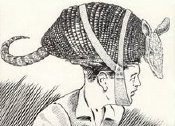
Michaelis is at his best articulating the appeal of "Peanuts" through the decades. In the 1950s it struck a chord with people feeling guilty over their vague discontent amid historic postwar prosperity (Linus watching a leaf fall: "Nobody's happy where they are"). In the 1960s it expressed the struggle of young people reaching for inchoate freedoms and pondering the meaning of existence (Snoopy, wondering why he was put on Earth: "I haven't got the slightest idea"). More than anything, "Peanuts" upended the belief that childhood is a time of innocence and happiness, for a child's pain is more acute than an adult's. "Charlie Brown reminded people … of what it was to be vulnerable, to be small and alone in the universe, to be human," writes Michaelis, "—both little and big at the same time."
-- From Sharon Begley's review of David Michaelis' "Schulz and Peanuts: A Biography,"







